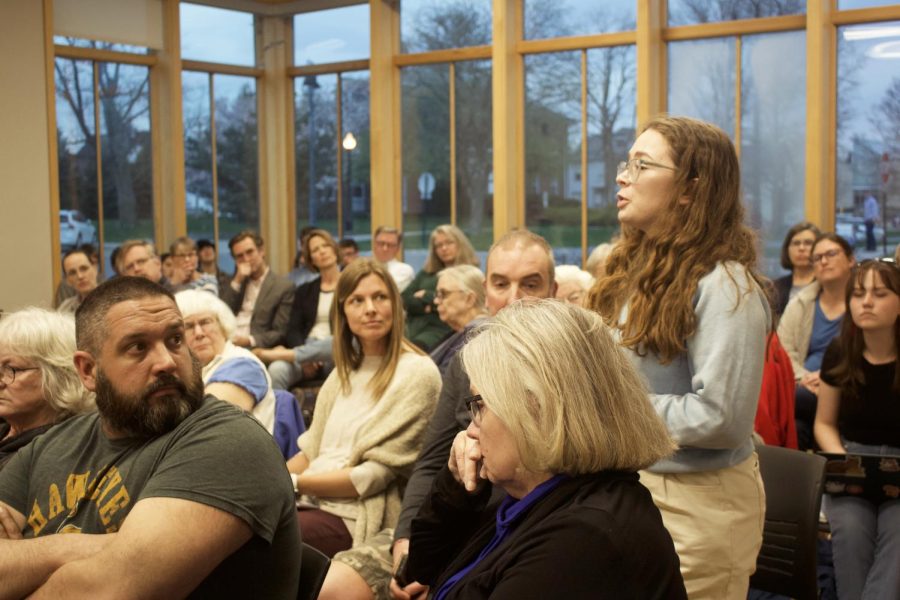“The Glass Castle” in jeopardy after parent files complaint
Mary Binzley `22 (standing) and other members of the Grinnell community gathered at the Drake Community Library to discuss the place of “The Glass Castle” in GHS’s curriculum.
April 21, 2023
Over 60 students, educators and community members gathered at Drake Community Library to debate the fate of Jeannette Walls’ memoir “The Glass Castle” in Grinnell-Newburg community school classrooms this past Wednesday, April 19.
The committee meeting was the first of two in reconsidering the current instructional materials accompanying the book in ninth-grade English classes. At the next meeting on May 3, the committee will deliberate and submit a proposed decision on the teaching of the book to the Grinnell-Newburg Board of Education.
Lindsey Starrett, a parent of a current Grinnell-Newburg High School (GHS) student, submitted a challenge form in early March 2023 contesting the suitability of the material for ninth-grade English classes. Walls’s memoir details the narrative of her dysfunctional family and struggles growing up in poverty — controversial subjects, such as child neglect and sexual assault, are present in the novel.
After the committee reviewing the material appointed a chairperson and secretary for the meeting and discussed the agenda, Starrett gave a brief speech covering the issues she saw with the text. Ranging from obscenities to rape culture, she listed over 10 contexts she considered age-inappropriate for high schoolers.
“Think about the fact that there are 14- and 15-year-olds reading this book,” Starrett said.
Starrett also took issue with what she said was an unequal learning substitution for the students who opted out of reading “The Glass Castle.” The memoir “Educated” was used as a substitute for her child. Starrett said there were not enough copies of the book provided to students wishing for an alternative, and many had to use an online PDF text. She also said these students were “just sent to the library” without any guidance in their learning.
Following Starrett’s opening that set up the ensuing discourse, 13 community members shared their opinions on altering the course curriculum, with the vast majority — 12 speakers — expressing beliefs against altering the curriculum.
A sophomore at GHS said the attempt to censor or change the learning material currently in use would only “silence Mrs. Walls and erase her story.” According to the student, reading this book in class allowed the possibility to see the realities of poverty.
“These issues are not going to go away by turning a blind eye to them,” the student added.
Loyal Terry `23 spoke during the public response open commentary to share what the possible censoring of a book meant to him. Terry said he “once aspired to live in this Grinnell community,” but due to a variety of reasons — including racial discrimination and this attempt to change the learning curriculum — he no longer sees living in Grinnell as a current possibility.
“This [is an] erasure of very real experiences to people across identity,” Terry said. “It is one of the reasons, unfortunately, I won’t consider staying in Grinnell.”
Three students addressed Starrett’s statements regarding alleged unfair teaching and grading for those students who did not participate in reading Walls’ memoir.
“We were given the option to skip the moments of sexual assault [in the book],” a freshman at GHS said.
This same freshman added that “banning books only serves one purpose — to promote ignorance.”
Despite this, Starrett reaffirmed that she had recently received an email notifying her that her daughter was failing the class where the book had been assigned despite being given an alternative learning assignment.
The committee spoke after the public response and answered questions from the audience.
One committee member, Kevin Hosbond, the English department chair at GHS who teaches Walls’ book, pointed out that Starrett said she had done “a speed read” when asked whether she had read the book in its entirety. Hosbond stressed the importance of nuance and taking excerpts out of context when filing a complaint on a book.
Hosbond said in recent years, the English department at GHS has attempted to diversify its teaching materials. On a table in front of him, he pointed to a series of books previously taught at the school, and explained how most of them were authored by white men. According to him, books such as “The Glass Castle” have been integrated into GHS’s curriculum to provide a more complex, worldly narrative that students could relate to.
Both Hosbond and Kevin Seney, principal at GHS, answered questions from those in the audience concerned over the process of alternate learning assignments. According to Seney, a permission slip sent home to parents concerning the teaching of “The Glass Castle” is not current policy, but the department is attempting to solve any alleged issues with students being required to read the novel when either they or a parent disagrees with the content.
The S&B approached Starrett after the meeting to interview, but she declined to comment.
The committee will meet again on May 3 at 6:30 p.m. at Drake Community Library. Community members are permitted to attend until the deliberation process, which is closed to the public.




















































Andrea Huston • Apr 21, 2023 at 5:35 pm
I actually read “the whole book.” And it is a marvelous, and true, story. It is a story about how a girl who comes from such challenging circumstances can live with the pain of poverty and mental disability in her family and still reach her full potential through hard work and education.
To say this book is “inappropriate” for 9th graders, in this day and age, is frankly insulting to the students. Does attempted rape not exist for 14 and 15 year olds? Beg to differ. Time for parents to wake up and talk to their kids about the realities in life, so as to break the chain of abuse that exists. Time to look at poverty in the eye, West Virginia, and every other State of the Union. Time to understand mental illness in a broader context.
This is a marvelous book, an eye-opening book. Should be required PTA reading.